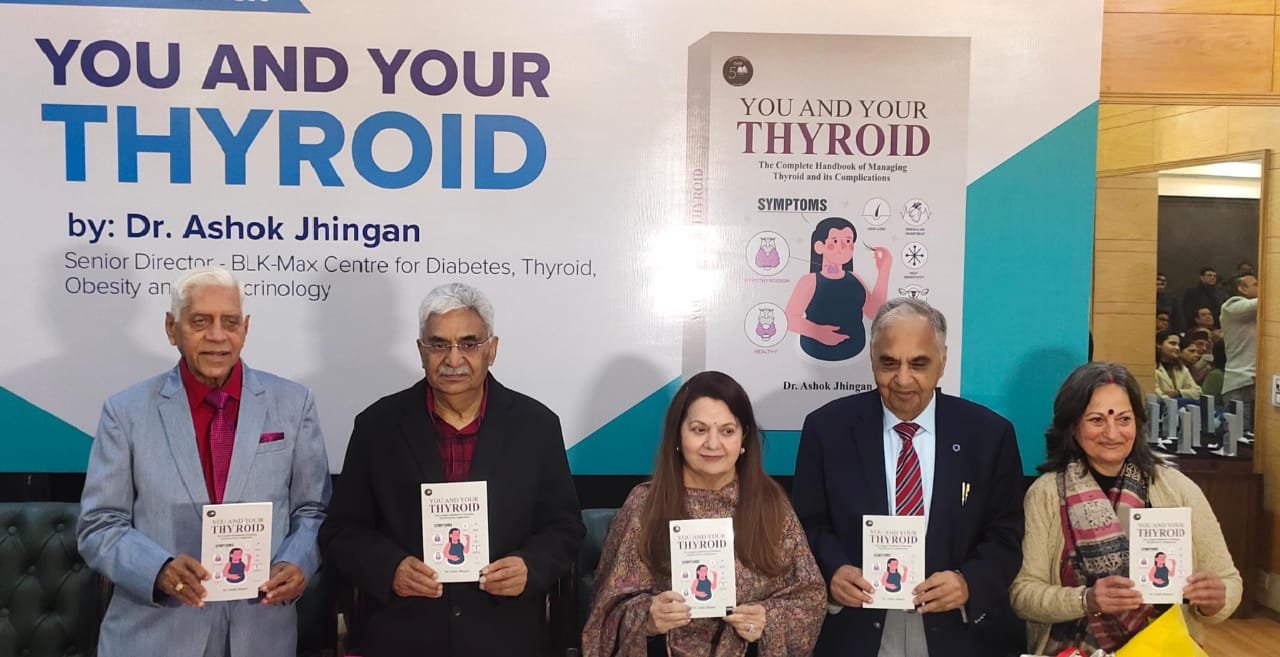You and Your Thyroid Book, written by renowned diabetologist Dr. AK Jhingan, launched
– Book released by BLK-Max Superspeciality in collaboration with Delhi Diabetic Research Center
11th January 2025, New Delhi: Here is some good news for Thyroid patients. Information about thyroid symptoms, tests, what to do and what not to do, other problems related to it, and solutions has been included in the book ‘You and Your Thyroid’. This book was formally released at the Constitutional Club today in collaboration with BLK-Max Superspeciality Hospital and Delhi Diabetic Research Center. On this occasion, Dr. T.S Kler, Head of the Heart and Vascular Department at BLK-Max Superspeciality Hospital was present as the chief guest. On this occasion, many senior doctors including Gangaram Hospital Chairman Dr. DS Rana, and Dr Rajesh Khadgawat, professor endocrinology AIIMS were present.
Dr AK Jhingan, author of the book You and Your Thyroid and Director of the Department of Diabetes, Thyroid, Obesity, and Endocrinology at BLK-Max Superspeciality Hospital, said, “This book is not just another book about managing thyroid diseases but a guide to calm anxious minds & explain the various aspects, myths & misconceptions about thyroid problems in a conscious and yet a consolidated manner. It is a effort which does not give gyan but samadhan to the problem. Thyroid diseases are, arguably, among the commonest endocrine disorders in India too, is no exception. According to a projection from various studies on thyroid disease, it has been estimated that about 42 million people in India suffer from thyroid diseases.
Studies have also recorded a high prevalence of thyroid disorder in the 13.4% diabetic population, with a higher prevalence (31.4%) among females with type 2 diabetes than males with T2DM (6.9%) The overall incidence of hyperthyroidism is estimated between 0.05% and 1.3%, with the majority consisting of subclinical disease.

The prevalence of Thyroid Dysfunction (TD) in all diabetic patients was 14,7%. In patients who had not or denied prior TD the frequency of TD was 13%. The most frequently TD was subclinical hypothyroidism, 13% of patients with T1DM and in 12% of patients with T2DM.
Dr Jhingan said that all the aspects related to the thyroid have been included in the book. How widespread is the disease? When should the test be done etc., how much and when should the medicine be taken, etc. Thyroid medicine should be taken on an empty stomach in the morning and nothing should be eaten for fifty minutes, while often patients eat something within ten to fifteen minutes. Most patients do not eat medicine when they visit for thyroid tests. Hypothyroidism medicine should be taken on an empty stomach in the morning, while hyperthyroidism medicine can be taken anytime. A thyroid test should be done before nine in the morning so that the test is not affected. The report is not correct if the test is done randomly or at any time of the day. Patients should not reduce the dose or quantity of medicines themselves etc. Till now there was no such book on all these topics, We are happy to launch such a useful book for patients so that patients get complete information in a single book.
This book is a complete handbook of managing thyroid diseases & its complications that most of the thyroid patients have many types of dilemmas and questions about the disease. An important problem has also been observed that when the thyroid becomes normal, the patients stop taking the medicine, after which many other problems also increase. These patients are at a higher risk of having many other health problems like diabetes, gynecological, skin and heart problems, etc. Problems have also been seen in pregnancy in the case of thyroid.
Weight gain, fatigue, lethargy, feeling colder, constipation, dry skin, etc. are the symptoms of low thyroid (hypothyroidism). On the contrary, weight gain, lethargy, constipation, feeling colder, etc. are the symptoms of increased thyroid (hyperthyroidism). Sometimes the voice becomes heavy when the nodules grow. This can also be a symptom of uncontrolled thyroid.
The book has been written in simple language keeping in mind the common and concern issues and problems of patients.
For more information Contact-
Dr A K Jhingan
Mb: 98100 04084













Leave a Reply